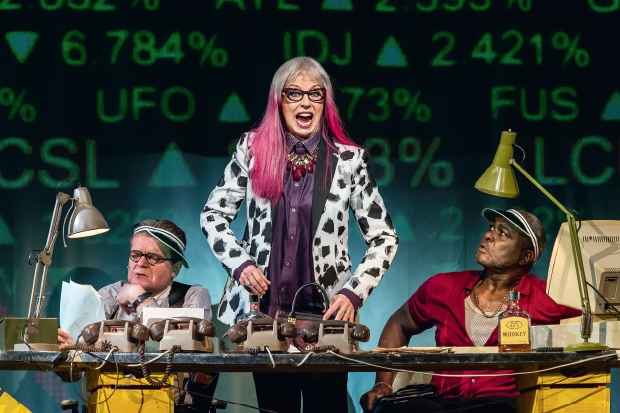Brecht/Weill’s Rise and Fall of the City of Mahagonny was premièred in 1930, Auden/Stravinsky’s The Rake’s Progress in 1951. Twenty-one years separate them, but it seems, as one looks back, enormously more than that. Think of 1994 and now, no time at all, and not only for an ageing opera reviewer. Both works tend to be routinely referred to as masterpieces, but seeing them both in the space of three days — Mahagonny at the Royal Opera, The Rake’s Progress at the Royal Academy of Music — I felt fairly strongly that they are both patchy pieces, neither representative of their composer at or even near his best. What is most interesting about them is their relationship to other music, both of their own time and of the preceding period; and both are clearly at least half in love with what they seem to be rejecting, both musically and — since both of them are heavily moralistic — morally.
The first thing to say about the Mahagonny production is that it was in the wrong place. The work itself felt uneasy in such grand traditional surroundings, and seemed to feel it needed to be on its best behaviour. Since Mahagonny is a prolonged — it felt very prolonged — study in bad behaviour, there was, right from the opening bars — unincisively conducted by Mark Wigglesworth — a pervasive sense of embarrassment, a straining on the part of the production and of most of the singers to be naughty while it was obvious that they would have enjoyed themselves more being good.
The old issue — what kind of voices suit Mahagonny best? — got no helpful answer. Unfortunately, Anne Sofie von Otter, a great artist who last appeared at Covent Garden 20 years ago, was in poor voice as Leocadia Begbick, her singing hardly a whisper, her speaking awkwardly amplified. The finest Begbicks I’ve seen — Martha Mödl and Astrid Varnay — were the greatest Brünnhildes and Isoldes of their time, their voices wonderfully raddled, both able to command the stage. Von Otter looked like a particularly annoying Despina in disguise, and sounded almost as irritating. The nearest approach to seductive sleaze came from Christine Rice as Jenny, and so did the best singing, but even she somehow failed to let her hair down as much as this piece demands. Kurt Streit looked good as Jimmy, but his voice is now more suitable for Aldeburgh.
The question was left open as to how far Mahagonny can any longer be regarded as a landmark and, obvious faults admitted, an enjoyable and instructive success. Surely there is too little music of substance, too much padding. The dialogue is — in Jeremy Sams’s translation, at any rate — too flat to retain the interest of an audience that has seen so many fascinating and involving works written since 1930. And as for the political content — absurd to say there is any. Mahagonny claims to be an anti-capitalist piece, but really it is anti-hedonistic, insisting that pleasure must be earned, must, both financially and in every other way, be paid for. That is a time-honoured position, part of the eternal dialogue about the relationship of pleasure to endeavour, and the excesses of a capitalist-consumer society are only one of its manifestations. But if that is the message, a walk round London’s West End will vouchsafe it far more powerfully.
And so to the Rake, which conveniently conveys the same warning, in the tiresome little vaudeville that follows the sublime Bedlam scene. The RAM’s programme book has an article in which the writer speculates that Stravinsky ‘warmed up’ as he went along, since he composed the opera linearly as the text arrived from Auden and Kallman. Certainly the opening scenes of the Rake are among Stravinsky’s most arid musical stretches, and nothing much happens musically until Anne’s ‘I go to him’. On the first evening Anne was sung, with radiant intensity, by Rhiannon Llewellyn, and if only one could have heard her words the effect would have been magical. The opera was performed without surtitles, and though that is meant to improve the singers’ diction and the audience’s concentration, it failed. The Nick Shadow of Bozidar Smiljanic was far clearer, and his sinister jocularity admirably sustained. The Rake himself is a problem: utterly passive, with little characterising music to sing until the graveyard scene, it’s hard to make him an interesting presence, and Bradley Smith lacks an individual — or sizeable — voice.
Still, this was at least as distinguished an evening as I have come to expect at the RAM, above all thanks to Jane Glover’s wonderful conducting, a mellower performance than I have heard before, but missing none of the score’s acerbities. The production, by John Ramster, is efficient and mainly traditional, with some inexplicable ‘deconstructive’ touches, including a white-coated medical man who wanders on from time to time to monitor Tom’s decline and help it on its way. So far as warning us against idle pleasures is concerned, Rake wins hands down, but Stravinsky’s soft-heartedness is still the most interesting thing about this work of intermittent genius.






Comments